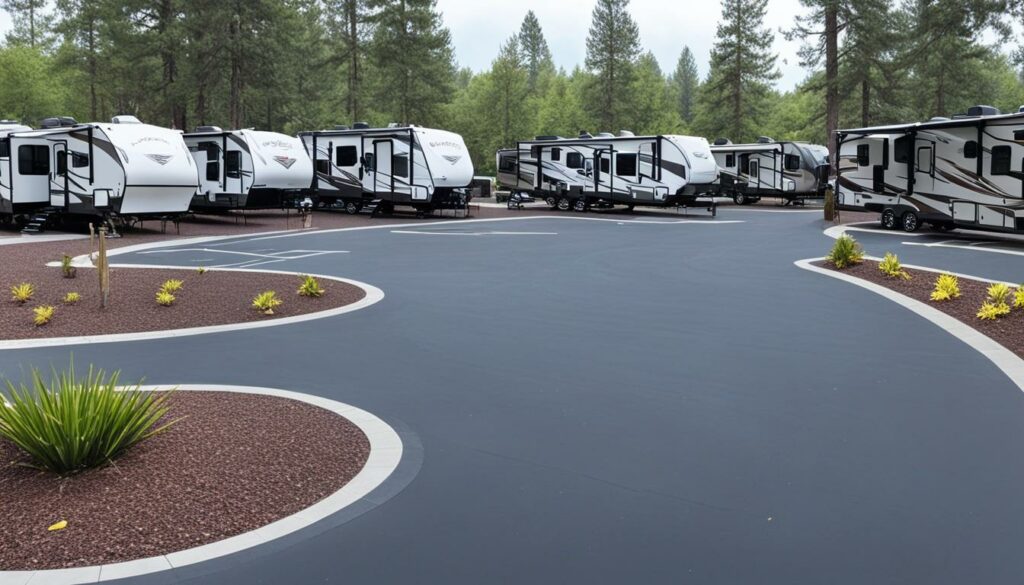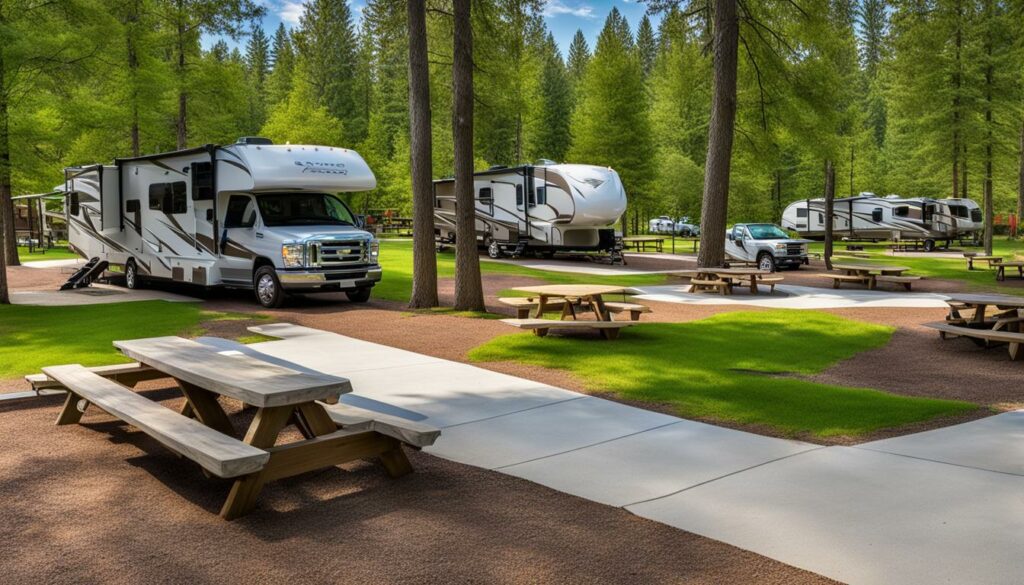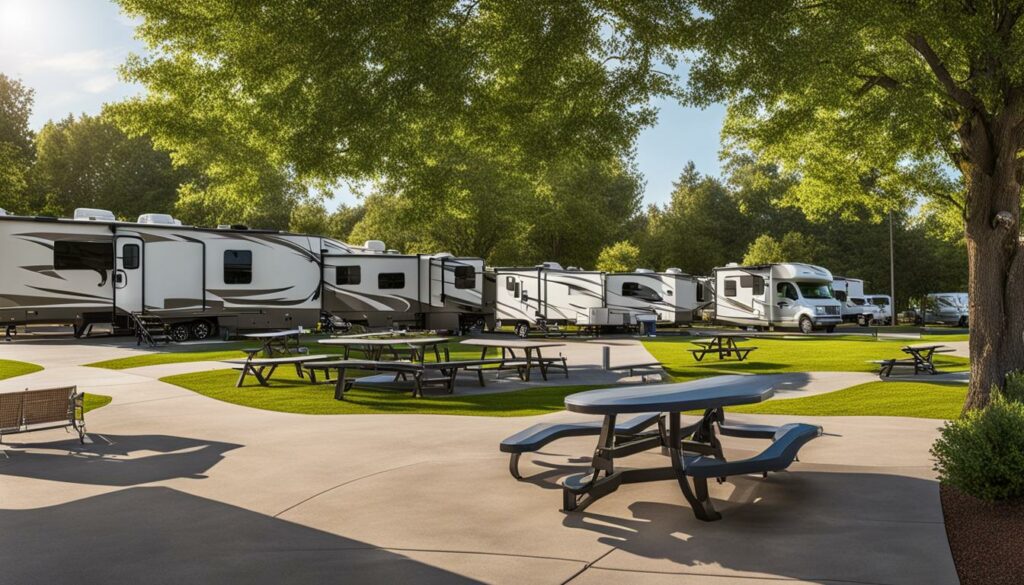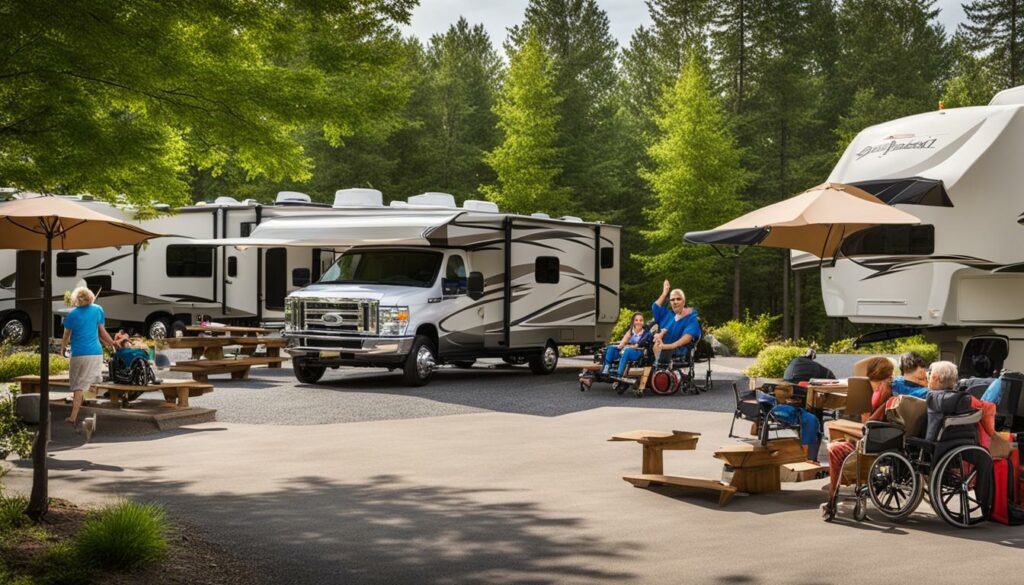As the popularity of RV travel continues to soar, it’s vital to ensure that all travelers have equal access to outdoor adventure. RV parks must be disability-friendly to accommodate the needs of disabled individuals wanting to enjoy the great outdoors. Disability-friendly RV parks provide the assurance that all travelers can experience the joys of RV travel, regardless of their physical abilities.
Key Takeaways:
- RV parks should be disability-friendly for all travelers to enjoy.
- Accessible RV parks offer a wide range of benefits for disabled travelers.
- Understanding ADA compliance is critical in making RV parks accessible.
- There are essential features that make RV parks disability-friendly.
- Finding inclusive RV parks is easier with online directories and campground reviews.
The Benefits of Accessible RV Parks

Traveling is an exciting adventure, but it can be challenging for individuals with disabilities due to the lack of accessibility in many places. Accessible RV parks are designed to provide equal access and offer disabled travelers a comfortable and safe environment to enjoy their outdoor adventures.
Accessible RV parks have several benefits for disabled travelers:
| Benefits | Description |
|---|---|
| Equal Access | Accessible RV parks provide equal access to individuals with disabilities to enjoy the same outdoor activities as non-disabled travelers. |
| Safe Environment | Accessible RV parks allow disabled travelers to feel safe and secure when participating in outdoor activities with their families and friends. |
| Comfort and Convenience | Accessible RV parks offer amenities like paved pathways, accessible restrooms, and shower facilities, making it easier for disabled travelers to navigate around the park and enjoy their stay in comfort. |
| Inclusivity | With accessible RV parks, disabled travelers can be a part of a community of outdoor enthusiasts that welcomes everyone, regardless of their physical abilities, creating a truly inclusive environment for all travelers. |
Having accessible RV parks is not only essential for the safety and comfort of disabled travelers, but it is also a necessary step towards creating a more inclusive society. These parks provide an opportunity for all travelers to connect, share experiences, and make lifelong memories.
Understanding ADA Compliance in RV Parks

RV parks that are accessible to all travelers, including those with disabilities, are in high demand. To cater to these travelers, it’s essential that RV parks adhere to the regulations set forth by the Americans with Disabilities Act (ADA).
The ADA is a federal law that prohibits discrimination against individuals with disabilities in all areas of public life, including parks and recreational facilities. RV parks that fall under the ADA’s jurisdiction are required to comply with specific accessibility standards to ensure that disabled travelers have equal access to facilities and amenities.
The ADA sets forth standards for a variety of areas pertaining to RV parks, including parking, restrooms, shower facilities, campsites, and recreational areas. Failure to meet these standards can result in legal consequences.
Some of the key requirements that RV parks must meet to be ADA compliant are:
| Requirement | Description |
|---|---|
| Accessible routes | RV parks are required to have clear, level pathways that are at least 36 inches wide to allow wheelchair users to move around comfortably. |
| Accessible parking | Parks must have designated handicapped-accessible parking spaces located near accessible routes, with appropriate signage and marking. |
| Accessible restrooms and shower facilities | Parks must have accessible restrooms and shower facilities, with grab bars, accessible sinks, and enough space for a person in a wheelchair to maneuver. |
| Accessible campsites | Campsites must have a clear, level space for a tent or RV, a surface suitable for wheelchair users, and accessible picnic tables and fire pits. |
Ultimately, all RV parks must adhere to the specific accessibility requirements set forth in the ADA to be considered ADA compliant. By meeting these standards, RV parks not only ensure that they are legally compliant, but also that they are providing a welcoming environment for all travelers.
Key Features of Disability-Friendly RV Parks

RV parks that prioritize accessibility are an essential resource for disabled travelers. In this section, we will discuss the key features that make RV parks disability-friendly, highlighting the amenities and facilities that are necessary to provide a safe and comfortable environment for disabled travelers.
Accessible restrooms and shower facilities are a fundamental requirement for every RV park catering to disabled travelers. Such facilities must be spacious, with doors wide enough for wheelchair access and equipped with handles and grab bars. The restrooms and showers should also have features such as low sinks, a convenient seat, and adjustable showerheads with a hose.
Paved pathways throughout the park are another key feature, allowing wheelchair users to navigate the terrain comfortably. Clear and visible signs are also essential for disabled travelers to quickly locate important facilities within the park.
Accessible campsites with level surfaces, providing clear passage to picnic areas and recreational facilities is also a significant consideration. The campsites must be at the right height for wheelchairs, awnings, and slideouts, and reserved for disabled travelers located within proximity to other required amenities.
Overall, RV park facilities for the disabled must prioritize the ease of movement and convenience to the users. The facilities should be compliant with the Americans with Disabilities Act (ADA) and regularly maintained to ensure that each of its elements remains functional and safe.
Finding Inclusive RV Parks

Traveling in an RV can be a great way to explore the country, but finding a campground with the right facilities can be a challenge for disabled travelers. Luckily, there are resources available to help find RV parks that are inclusive and handicap accessible.
Online Directories for Inclusive RV Parks
One helpful resource for finding inclusive RV parks is online directories. These websites, such as RVparking.com and RV Trip Wizard, offer filters to search for specific amenities, including handicap accessible features. This can help narrow down the search to RV parks with facilities that meet the traveler’s needs.
Campground Reviews and Recommendations
Another way to find inclusive RV parks is through campground reviews and recommendations from other travelers. Websites such as RV Park Reviews and Campendium provide reviews and ratings for campgrounds across the country, including information about accessibility and handicap accessible features. These reviews can be a helpful tool in choosing an RV park that is inclusive and meets the traveler’s needs.
Handicap Accessible Lists
Some RV park chains, such as KOA and Good Sam Club, also offer lists of handicap accessible RV parks on their websites. These lists can be a great starting point for disabled travelers to find RV parks that have been vetted for accessibility.
Final Thoughts
Traveling in an RV should be accessible and enjoyable for everyone. By utilizing online directories, campground reviews, and handicap accessible lists, disabled travelers can find RV parks with the facilities and amenities they need to make their trip a success.
RV Park Accessibility for Wheelchair Users
When planning a trip to an RV park, wheelchair users need to consider accessibility. The campsite should have level, paved surfaces for easy maneuvering of the wheelchair. A level cement area will ensure that the wheelchair remains steady and the user can transfer in and out of the RV with ease.
Access to on-site amenities like picnic areas and recreational facilities also needs to be wheelchair accessible. Before booking, travelers should check whether the RV park has wheelchair accessible trails, restrooms, and shower facilities.
Maneuvering the RV within the park can be difficult, and it is essential to check whether the campsites are big enough to accommodate a wheelchair and the RV. A wheelchair user might face difficulties in moving around the RV park, and so, planning in advance is crucial.
Wheelchair accessibility not only provides comfort to users but also promotes safety. RV parks that provide wheelchair accessible campsites prioritize the safety and well-being of disabled travelers.
The Role of RV Park Owners and Management
RV park owners and management play a critical role in making RV parks accessible and disability-friendly. Providing facilities that cater to the needs and requirements of disabled travelers not only provides a comfortable and safe environment for them but also encourages them to keep exploring and enjoying the outdoors. RV park management must take adequate measures to ensure their facilities comply with Americans with Disabilities Act (ADA) accessibility standards. Furthermore, it is essential to train staff on accessibility awareness and how to address concerns related to disability-friendly facilities.
One way RV park owners can maintain accessibility is by regularly inspecting and maintaining their accessible features, including parking spaces, restrooms, showers, and campsites. Inclusivity should also be reflected in the RV park’s policies, marketing, and communication. RV Park owners must partner with disability advocacy groups to get feedback and suggestions for improvement.
By providing RV parks with disability-friendly facilities, RV park owners and managements are encapsulating the true meaning of community inclusion and togetherness. This, in turn, goes a long way in creating a positive and welcoming environment for disabled travelers.
Creating a Welcoming Environment for All Travelers
RV parks can be a home away from home for travelers, including those with disabilities. It is crucial to create an environment that fosters inclusivity and ensures that all travelers feel welcome and comfortable. By providing RV park disability facilities, owners and management can take a significant step towards promoting inclusivity.
One way to create a welcoming environment is by promoting accessible recreational activities for all travelers. This can include offering accessible trails and fishing piers, making sure that the RV park’s pool is equipped with pool lifts, and installing accessible playground equipment for children with disabilities. By promoting these accessible amenities, RV parks can ensure that travelers with disabilities are not excluded and can participate in all the park has to offer.
Another way to promote inclusivity is by training staff on accessibility awareness. Staff should understand how to identify and address accessibility challenges and know-how to communicate effectively with travelers with disabilities. By building staff capacity in this area, RV parks can create an environment where travelers with disabilities feel supported throughout their stay.
Finally, RV parks should encourage all travelers to be respectful of each other and to value diversity. This can include promoting events that celebrate different cultures and traditions and ensuring that the park is free from discrimination. By creating a culture of respect, RV parks can create a welcoming environment for all travelers, including those with disabilities.
Creating a welcoming environment in RV parks is crucial for all travelers. By implementing disability-friendly facilities, promoting accessible recreational activities, training staff on accessibility awareness, and fostering a culture of respect, RV parks can create a diverse and inclusive community where all travelers feel welcome and supported.
Conclusion
Ensuring RV parks have disability-friendly facilities is crucial in providing equal access to outdoor recreational activities for all travelers. Accessible RV parks not only enhance the travel experience for people with disabilities but also create a welcoming environment for all travelers and foster a diverse and inclusive community.
RV park owners and management play a vital role in promoting accessibility by meeting ADA compliance and maintaining disability-friendly amenities. It is essential to provide adequate training to staff on accessibility awareness, address any accessibility concerns or issues, and create a supportive environment for disabled travelers.
As the need for accessibility in RV parks continues to grow, it is crucial to promote and prioritize disability facilities in the planning and development process. By providing accessible restrooms, showers, paved pathways, and wheelchair accessible campsites, RV parks can ensure that all travelers can enjoy their outdoor adventures.
RV park disability facilities are not only necessary for compliance but also demonstrate a commitment to inclusivity and respect for all travelers. As such, continued efforts in promoting accessibility in RV parks for disabled travelers are necessary to create a safe and comfortable environment for everyone.
FAQ
What are RV park disability facilities?
RV park disability facilities are amenities and features designed to accommodate people with disabilities. These facilities include accessible restrooms, shower facilities, paved pathways, and wheelchair accessible campsites.
Why are accessible RV parks important for disabled travelers?
Accessible RV parks are important for disabled travelers because they provide equal access to outdoor recreational activities. These parks offer amenities and facilities that cater to the needs of people with disabilities, ensuring a safe and comfortable travel experience.
What is ADA compliance in RV parks?
ADA compliance in RV parks refers to meeting the requirements of the Americans with Disabilities Act. This act mandates that RV parks have accessible features such as ramps, designated parking spaces, and accessible restrooms to ensure equal access for people with disabilities.
What are the key features of disability-friendly RV parks?
Disability-friendly RV parks have key features such as accessible restrooms, shower facilities, paved pathways, and wheelchair accessible campsites. These parks prioritize the comfort and safety of disabled travelers by providing facilities that cater to their specific needs.
How can I find inclusive RV parks with handicap accessible features?
You can find inclusive RV parks with handicap accessible features by using online directories and websites that specifically list RV parks with these amenities. Additionally, reading campground reviews and recommendations from other travelers can provide valuable insights.
How can RV parks enhance accessibility for wheelchair users?
RV parks can enhance accessibility for wheelchair users by providing level, paved campsites and easy access to amenities such as picnic areas and recreational facilities. It is important for RV parks to have infrastructure in place that allows easy maneuvering of wheelchairs within the park.
What is the role of RV park owners and management in providing disability-friendly facilities?
RV park owners and management play a crucial role in providing disability-friendly facilities. They need to train their staff on accessibility awareness, ensure the maintenance of accessible features, and promptly address any accessibility concerns or issues raised by disabled travelers.
How can RV parks create a welcoming environment for all travelers?
RV parks can create a welcoming environment for all travelers by fostering inclusivity. This can be done by promoting awareness and understanding of different disabilities, offering assistance when needed, and ensuring that disabled travelers feel supported and comfortable throughout their stay.
Why is it important to prioritize RV park disability facilities?
It is important to prioritize RV park disability facilities to ensure that all travelers, regardless of their abilities, can enjoy their outdoor adventures. By providing accessible amenities and facilities, RV parks can promote inclusivity and allow people with disabilities to fully participate in the RVing experience.





